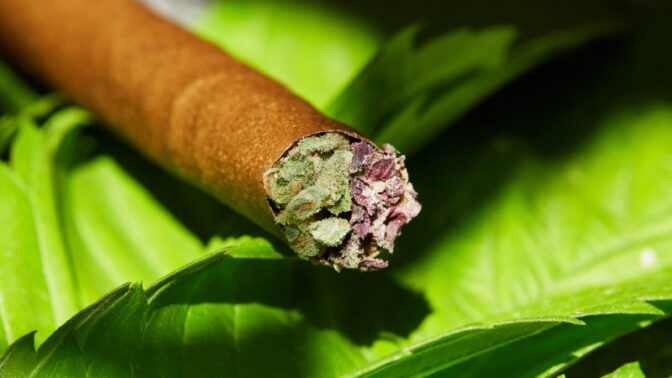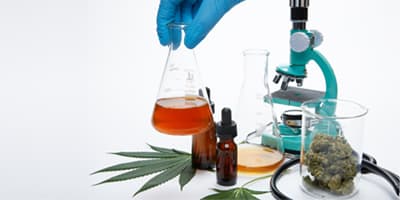In the mid-1600s, hemp was a cash crop for European settlers who had recently arrived in what would become the United States. It remained an integral part of the colonies', and later independent country's economy for centuries, until the early 1900s, when Americans started to change their attitude toward cannabis.
The budding marijuana movement of the present day has overcome enormous obstacles in its long, winding attempt to end cannabis prohibition, from the fear that was ingrained into society by Harry Anslinger, the infamous 1936 drama “Reefer Madness,” and the war on drugs initiated by the Nixon administration in the 1970s.
Cannabis legalization hasn't spread across the U.S. in a linear fashion, though. Aside from a few exceptions, notably Colorado, medical marijuana legislation took root on the West Coast, followed soon after by the Northeast.
Prohibition received its first series of blows when California, Oregon, and Washington legalized medical cannabis during the 1990s. Voters in these three Pacific Coast states were also among the first to legalize recreational cannabis, starting with Washington. Then, as if the enthusiasm behind weed legalization decided to board an airplane and fly east, the next wave of legalization began in the Northeast, with a layover in Colorado.
Gradually, cannabis prohibition has been withering, now that 10 states have legalized adult-use cannabis, also known as recreational use, and a total of 33 have medical marijuana legislation in place. Some states without any form of legal cannabis are starting to allow medical use of cannabidiol (CBD) products with low amounts of THC.
The federal government also is starting to embrace the plant that was a vital part of the U.S. economy. The 2018 Farm Bill, signed Dec. 20, 2018, removed hemp's status as a controlled substance and legalized industrial hemp production.
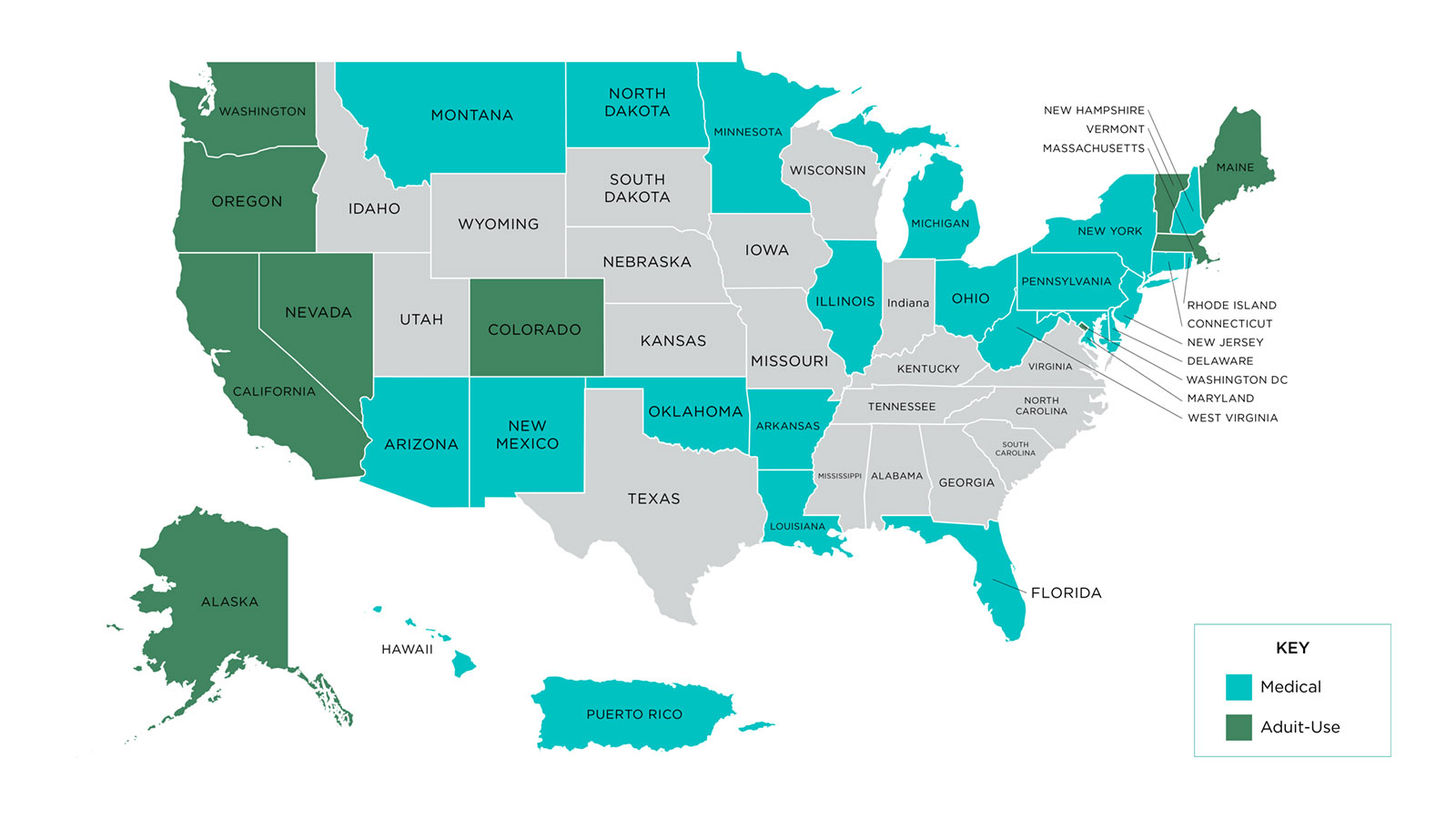
States That Legalized Adult-Use Weed
Alaska
- Alaskan voters approved the Alaska Medical Marijuana Initiative, or Measure 8, in 1998. While the bill technically legalized medical cannabis use for qualifying patients to possess and use, the system did not initially provide patients with a legal way to obtain medical marijuana.
- The Alaska Marijuana Legalization Initiative, or Measure 2, was approved by 53% of voters in 2014, making it the third state to legalize recreational cannabis. The measure allowed for the regulation, production, sale, and use of recreational cannabis across The Last Frontier. Under the law, which went into effect February 2015, adults 21 and older are permitted to possess up to 1 ounce, or 28.35 grams, of usable cannabis and up to six cannabis plants at home for personal use.
California
As the first state to legalize the medical use of cannabis and break the chains of prohibition, California has solidified itself as a pioneer of the cannabis legalization movement.
- The state's medical system was established in 1996 after the Compassionate Use Act, or Proposition 215, was passed by voters, making it the first medical marijuana ballot initiative to pass at the state level.
- Two decades later, on November 8, 2016, California voters passed Proposition 64, legalizing the sale and consumption of recreational cannabis for adults 21 or older. Adult-use sales began Jan. 1, 2018.
Colorado
The Centennial State has been a trailblazer of the cannabis movement in the U.S., becoming one of the first states, on Nov. 6, 2012, to vote for recreational cannabis legalization.
- Medical cannabis was legalized in Colorado after the approval of Initiative 20, which earned 53.5% of the vote, in 2000.
- The Colorado Marijuana Legalization Amendment, or Amendment 64, was approved by 55.3% of voters on November 6, 2012. A landmark law for the nationwide recreational cannabis movement that followed, the measure legalized recreational cannabis for adults 21 and older, and established sales and cultivation taxes. Many of the laws and regulations established in Colorado have been closely observed and adopted by other states.
Maine
- Medical cannabis has been legal in Maine since 1999. Maine Medical Marijuana for Specific Illnesses, or Ballot Question 2, passed with 61% of voters in favor. This legislation allowed doctors to recommend medical cannabis to patients suffering from serious health conditions.
- Maine was one of four states to legalize recreational cannabis during the general election in November 2016. The Marijuana Legalization Act, or Ballot Question 1, made it legal for adults 21 and older to possess, consume, and cultivate marijuana for personal use.
Massachusetts
- The Massachusetts Medical Marijuana Ballot Initiative, or Question 3, was approved by 63% of voters in November 2012. After the measure passed, the state established the Massachusetts Medical Use of Marijuana Program to regulate the medical cannabis system.
- Four years later, in November 2016, voters approved The Massachusetts Marijuana Legalization Initiative, or Question 4, which legalized adult use and led to the creation of the Cannabis Control Commission (CCC), which regulates marijuana statewide.
- Adults aged 21 and older are legally allowed to purchase, possess, and consume cannabis. Meanwhile, the CNB has been approving licenses for retail cannabis shops to open across the state.
Michigan
- Michigan voters approved the Michigan Compassionate Care Initiative on Nov. 6, 2008, legalizing medical cannabis use for seriously and terminally ill patients to use marijuana with a doctor's approval.
- Recreational cannabis system was legalized after Michigan voters approved Proposition 1 in November 2018, making it the first state in the Midwest to legalize recreational cannabis. Since then, the state has been slowly rolling out regulations and establishing its licensing for provisioning centers, the term Michigan uses for dispensaries, and cultivators.
- Proposition 1 made it legal for adults 21 and older to grow up to 12 plants and store up to 10 ounces, or 283 ½ grams, in their Michigan residence.
Nevada
- Nevada voters approved The Medical Use of Marijuana Act, or Question 9, in 2000 with 65.4% in favor of allowing patients to cultivate cannabis for medical use.
- The sale of medical marijuana was not permitted in the state until 2015, 15 years after Question 9 was passed. Shortly after, on Nov. 8, 2016, 54.4% of voters in Nevada voted in favor of the Nevada Marijuana Legalization Initiative, or Question 2, allowing adults 21 and older to purchase and consume cannabis recreationally.
- Under Question 2, the law permits possession of up to 1 ounce, or 28.35 grams, of flower; or one-eighth of an ounce, or 3.54 grams, of marijuana concentrates.
Oregon
Both recreational and medical marijuana were legalized in Oregon following a similar timeframe as its neighboring state to the south.
- Medical marijuana was legalized in 1998 with 54.6% of voters approving the Oregon Medical Marijuana Act.
- Legal adult-use marijuana followed in 2014 when the Control, Regulation, and Taxation of Marijuana and Industrial Hemp Act passed, with 56.1% of the vote.
- Cannabis consumers in the Beaver State, who must be 21 or older, are allowed to buy 1 ounce, or 28.35 grams, of cannabis flower per day.
Vermont
- The medical cannabis system in Vermont was established in 2002, giving qualified patients access to medical cannabis. Republican Gov. Phil Scott expanded the program on June 9, 2017, by signing S.16, a measure that improved patients' access to medical marijuana by adding more qualifying conditions and setting regulations to allow additional dispensaries.
- In Vermont on Jan. 22, 2018, H. 511, legalized the possession and cultivation of cannabis for recreational use by adults 21 and older.
- The law allows adults to legally possess up to 1 ounce of marijuana and grow up to two mature marijuana plants. The Vermont Senate voted 23-5 to pass S.54, a bill that would regulate and tax cannabis sales, on Feb. 28, 2019.
- Though Vermont law permits adult-use cannabis, the state does not offer residents a legal way of purchasing marijuana. Vermont's five dispensaries serve medical patients only.
Washington
Similar to the other states on the West Coast, Washington was among the first states to usher in a new era of legalized medical and recreational cannabis.
- The Medical Use of Marijuana Act, or Initiative 692 (I-692), was passed in 1998 with nearly 60% of the vote, providing protections to qualifying patients and caregivers.
- In November 2012, nearly 15 years after the passage of the medical marijuana initiative, voters in the Evergreen State approved recreational cannabis legalization via the Washington Marijuana Legalization and Regulation Initiative, or Initiative 502 (I-502).
District of Columbia
- Washington, D.C., legalized medical cannabis with the voter-approved Legalization of Marijuana for Medical Treatment Initiative of 1998, or Initiative 59. The measure, which was initially blocked by Congress under the Barr Amendment, eventually allowed patients and caregivers to purchase medical cannabis from a registered dispensary designated on a patient's registration identification card. The first medical cannabis sale didn't take place until 2009, more than a decade after medical marijuana legislation was passed.
- The Legalization of Possession of Minimal Amounts of Marijuana for Personal Use Act of 2014, or Initiative 71, was approved by nearly 65% of Washington voters in November 2014 and allowed adults 21 and older to possess small amounts of cannabis for recreational use.
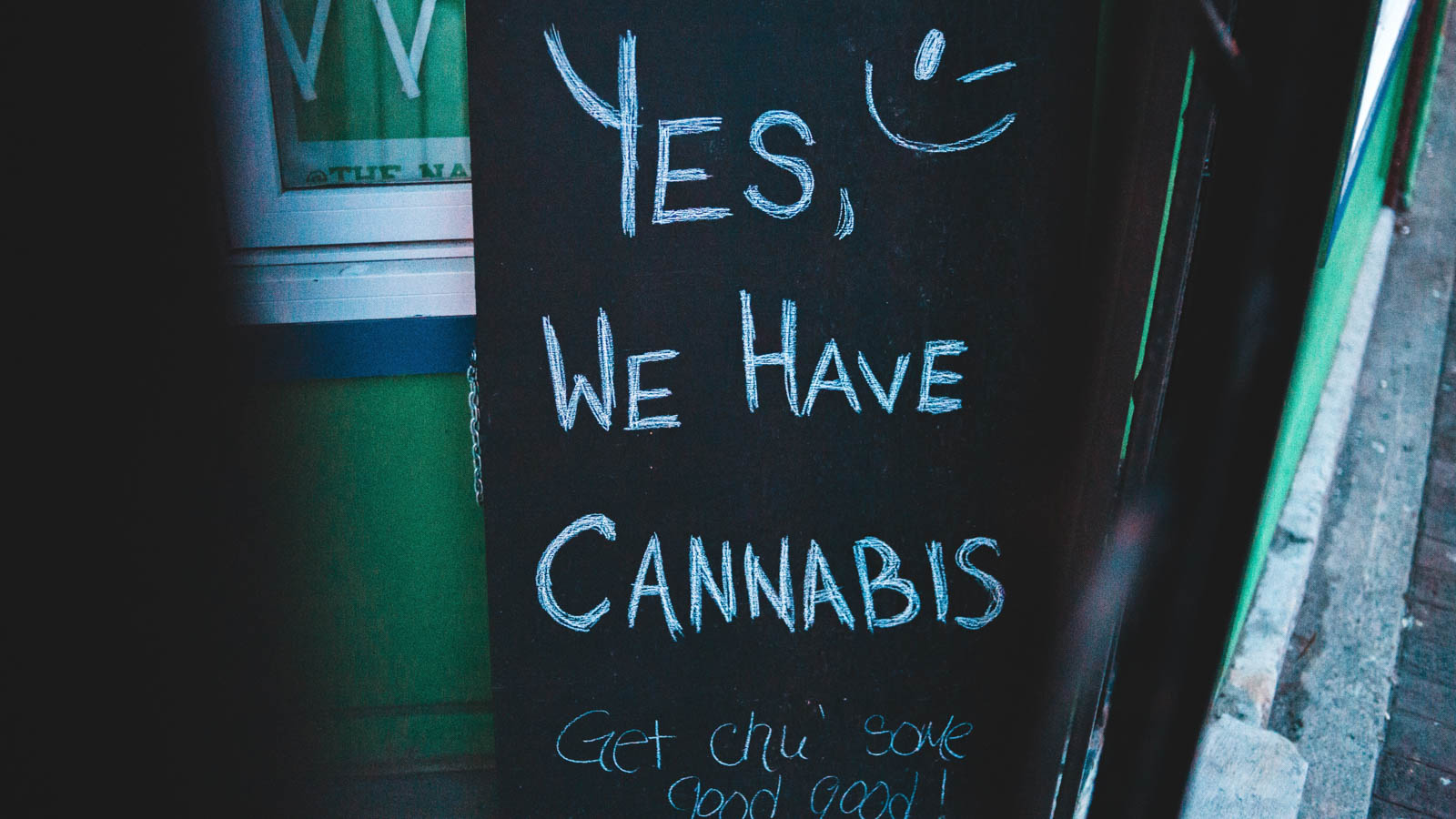
States That Have Legalized Medical Weed
Alabama
- Alabama has taken a restrictive and gradual approach to legalize medical marijuana. In 2014, Republican Gov. Robert Bently signed Carly's Law, allowing the University of Alabama at Birmingham to conduct a five-year clinical study in which non-intoxicating CBD oil was administered to children with seizures. A slightly more expansive measure, Leni's Law, was passed on July 1, 2016, allowing possession and use of CBD oil by patients with a debilitating medical condition as diagnosed by a physician.
- Aside from CBD products, the state has not legalized medical or recreational weed.
Arizona
- Voters narrowly passed the Arizona Medical Marijuana Question in 2010, garnering 50.13% of the vote.
- Arizona voters have been making a concerted effort to legalize medical marijuana since the first initiative was approved in 1996, but later overturned. Proposition 203, a measure that aimed to legalize medical cannabis in 2002, was defeated with 57% voting no.
- The state has not legalized weed for recreational use.
Arkansas
- The Arkansas Medical Marijuana Amendment, or Issue 6, won 53% approval on Nov. 8, 2016. The law allows qualifying patients to obtain and consume medical marijuana with a doctor's approval.
- The state intends to finish the approval process and allow medical marijuana sales to start in mid-May 2019, according to The Associated Press.
- The state has not legalized weed for recreational use.
Connecticut
- The Connecticut General Assembly of Representatives passed HB 5389, which legalized the medical use of cannabis, in May 2012. Registered patients and caregivers can purchase medical cannabis from licensed dispensaries throughout the state.
- Connecticut has not legalized recreational marijuana, but state officials have made strong legislative efforts to allow adult-use in 2019. Possession of small amounts of cannabis was decriminalized after Democratic Gov. Dannel Malloy signed a General Assembly-drafted measure in June 2011.
Delaware
- The Delaware Medical Marijuana Act (DMMA) was signed by Gov. Jack Markell in 2011, allowing qualifying patients and their caregivers to purchase and consume cannabis for medical use. Prior to the signing of the DMMA, possession of cannabis was a criminal offense. However, in December 2015, Delaware House Bill 39 took effect, decriminalizing cannabis possession statewide.
- The state has not legalized recreational weed, but cannabis possession was decriminalized statewide in December 2015 after Delaware House Bill 39 took effect. Recreational legalization was attempted in 2018 with House Bill 110, but failed to pass in the Statehouse.
Florida
- Medical cannabis was first introduced in the Sunshine State in 2014 with the passage of the Compassionate Medical Cannabis Act. The restrictive law gave seriously ill patients with cancer or epilepsy access to low-THC cannabis.
- In 2016, more than 70% of voters approved The Florida Medical Marijuana Legalization Initiative, or Amendment 2, ushering in broader legalization of medical cannabis and expanding the list of qualifying conditions.
- After Amendment 2 passed, Florida lawmakers imposed a ban on smokable marijuana. The state's Supreme Court voided the ban, and lawmakers passed a bill in early 2019 to permit smokable forms of medical marijuana. Republican Gov. Ron DeSantis signed the bill March 18, 2019.
- The state has not legalized recreational weed.
Hawaii
- Medical cannabis was technically legalized in Hawaii in 2000 with Act 228, but dispensaries were not approved until after the passage of Act 241, which led to the creation of the state's Medical Cannabis Dispensary Program. The licensing system for dispensaries and production centers was established shortly after when Democratic Gov. David Ige signed Act 242. The first medical marijuana dispensaries did not begin opening in the state until 2018.
- The state has not legalized recreational marijuana, but on March 19, 2019, two Hawaii Senate committees approved a bill to decriminalize possession of small amounts of marijuana.
Illinois
- Medical cannabis was legalized in Illinois after Democratic Gov. Pat Quinn signed the Compassionate Use of Medical Cannabis Pilot Program Act in August 2013, allowing qualifying patients and caregivers to legally purchase medical marijuana from a dispensary.
- The state has not legalized recreational weed, but Democratic Gov. J.B. Pritzker confirmed during his inaugural address in January 2019 that he intended to legalize recreational cannabis. As of April 2019, other state lawmakers have joined the governor to openly push for full-scale recreational legalization, according to Chicago ABC affiliate WLS-TV.
Louisiana
- Medical cannabis was technically legalized in Louisiana after Democratic Gov. John Bel Edwards signed SB 271 in 2016. However, as of April 2019, the state has failed to implement a system because of a variety of regulatory and legislative issues.
- Current law mandates that the state's cannabis supply must be cultivated by a single producer and distributed to 10 pharmacies. GB Sciences, the chosen cultivator operating the Louisiana State University AgCenter, intends to have cannabis available sometime in 2019.
- The state has not legalized weed for recreational use.
Maryland
- Medical marijuana was legalized in Maryland with House Bill 881, or the Natalie M. LaPrade Medical Marijuana Commission, signed by Democratic Gov. Martin O'Malley on April 14, 2014. The Maryland Medical Cannabis Commission (MMCC) is responsible for establishing and enforcing the program's regulations regarding consumption, cultivation, possession, and distribution of cannabis for medical use.
- The state's first legal medical cannabis transaction took place in December 2017, more than three years after the legislation was signed.
- The state has not legalized recreational weed.
Minnesota
- The Minnesota Medical Cannabis Act was signed into law by Democratic-Farmer-Labor (DFL) Gov. Mark Dayton on May 29, 2014, making the state the 23rd to legalize medical marijuana. By spring 2014, patients with qualifying medical conditions were allowed to receive certification from health care practitioners and enroll in the program.
- Medical cannabis must be consumed in the form of a liquid, topical, pill, or vape; flower is not legal.
- The state has not legalized weed for recreational use. A measure to legalize recreational cannabis in Minnesota, aptly named HF 420, was introduced on Jan. 28, 2019.
Missouri
- The Missouri Legislature in 2014 passed HB 2238, which created the Missouri Hemp Extract Registration Program (MHERP). The state's regulations allow only qualifying patients with intractable epilepsy to obtain, possess, and use low-THC hemp extract.
- The state has not legalized recreational weed. Possession of 10 grams or less of flower was reduced to a misdemeanor in 2014 after SB 491 passed.

Montana
- Nearly 62% of Montana voters decided to legalize medical cannabis in 2004 via a ballot initiative, the Montana Medical Marijuana Allowance, or I-148.
- Lawmakers attempted to repeal the law in 2011, and after the initial effort was vetoed by Democratic Gov. Brian Schweitzer, the state Senate enacted Senate Bill 423, which added stringent conditions to the existing medical marijuana system.
- In 2016, nearly 58% of voters approved the Montana Medical Marijuana Initiative, or I-182, removing many of the restrictive regulations and adding more qualifying conditions.
- The state has not legalized weed for recreational use.
New Hampshire
- New Hampshire passed medical marijuana legalization in 2013 with House Bill 573 (HB 573), a measure that established a restrictive system of qualifying conditions, which required patients to exhibit severe symptoms of the debilitating condition. The Granite State was the 19th state to legalize medical cannabis, but was the last in New England.
- The state has not legalized recreational weed, but a marijuana decriminalization bill was signed by Republican Gov. Chris Sununu in 2017, reducing penalties for possessing three-fourths of an ounce, or 21.26 grams, or less of cannabis from a misdemeanor to a civil violation. The New Hampshire House gave preliminary approval to recreational legalization on Feb. 27, 2019.
New Jersey
- The New Jersey Compassionate Use Medical Marijuana Act (CUMMA), or SB 119, was passed in January 2010, making New Jersey the 14th state to legalize medical cannabis. The state's list of qualifying conditions was expanded by Democratic Gov. Phil Murphy in March 2018.
- The state has not legalized recreational weed but has come extremely close to passing adult-use legislation, expungement, and a medical expansion. These bills were recently pulled from the legislative agenda because they lacked enough votes to pass in the Senate. Advocates are encouraging a vote before the end of June.
New Mexico
- New Mexico expanded its medical cannabis system after passing the Lynn and Erin Compassionate Use Act, or SB 523, in 2007. The measure gave qualified patients and caregivers access to medical cannabis.
- The state has not yet legalized weed for recreational use, but Democratic Gov. Michelle Lujan Grisham signed a marijuana decriminalization bill on April 3, 2019. After the state's legislative session ended on March 16, 2019, Grishman also urged her colleagues to put recreational cannabis legalization back on the agenda for the next session.
New York
- Medical cannabis is legal in the state of New York under S923, a part of New York's Compassionate Care Act, which was signed into law by Democratic Gov. Andrew Cuomo in 2014. The measure allows “possession, manufacture, use, delivery, transport, or administration of medical marihuana by a designated caregiver for a certified medical use,” but excludes flower as a legal form of consumption.
- The state has not legalized recreational weed, However, city and state officials, including Cuomo, have taken steps toward legalization of adult-use cannabis. A proposal that aimed to legalize marijuana statewide was dropped from the budget in March 2019. The legislature and the governor have committed to finding a resolution by the end of the session in June 2019.
North Dakota
- Medical cannabis was approved by North Dakota voters in November 2016, but the state's first dispensary did not open until March 1, 2019. The House passed various bills in February 2019 to expand the existing medical marijuana system, including a measure to add more qualifying conditions to the state's list.
- The state has not legalized weed for recreational use. Voters rejected an initiative, Measure 3, to fully legalize adult-use of marijuana on Nov. 6, 2018.
Ohio
- Medical cannabis was legalized in Ohio after House Bill 523, or HB 523, was passed in September 2018. One year later, the Ohio Department of Commerce (ODOC), the state department responsible for developing medical marijuana regulations, set forth rules for cultivation, lab testing, qualifying patients, and more. The state's first four medical marijuana dispensaries opened in January 2019.
- The state has not legalized recreational weed.
Oklahoma
- Oklahoma became the 30th state to legalize medical marijuana after voters approved the Medical Marijuana Legalization Initiative, or SQ 788, on June 23, 2018.
- The state has not legalized weed for recreational use.
Pennsylvania
- The Medical Marijuana Act was passed by the Pennsylvania General Assembly on April 17, 2016, legalizing the possession, sale, and consumption of medical cannabis. The first dispensary opened in May 2018. Flower and edibles are not allowed to be sold.
- The state has not legalized recreational weed.
Rhode Island
- Rhode Island became the 11th state to legalize medical cannabis after the passage of The Edward O. Hawkins and Thomas C. Slater Medical Marijuana Act, in 2006. The measure was initially vetoed by Republican Gov. Donald Carcieri in June 2005, but his veto was overridden by the state House.
- The state has not legalized recreational weed, but possession of small amounts of cannabis has been decriminalized. In January 2019, Democratic Rhode Island Gov. Gina Raimondo stated that she would work on a proposal to end cannabis prohibition in the Ocean State.
Utah
- Proposition 2, a measure allowing qualifying patients to obtain and use medical marijuana, was passed in Utah on Nov. 6, 2018. It also set up a licensing framework from facilities to grow, process, test, and sell cannabis for medicinal use.
- Qualifying patients were legally protected starting Dec. 1, 2018, but most of the regulatory and licensing guidelines in the proposition will not be enacted until 2020.
- Previously, in March 2014, Republican Gov. Gary Herbert signed HB 105, which in addition to permitting industrial hemp production, also allowed patients with intractable epilepsy to consume low-THC CBD oil.
- The state has not legalized weed for recreational use.
West Virginia
- The West Virginia Medical Cannabis Act, or Senate Bill 386, was signed into law on April 19, 2017, allowing medical cannabis to be consumed in the form of pills, oil, topicals, or vaporization, but excluding flower. The Bureau for Public Health intends to distribute patient and caregiver identification cards in July 2019, but that deadline could be delayed because of regulatory issues.
- The state has not legalized recreational marijuana.
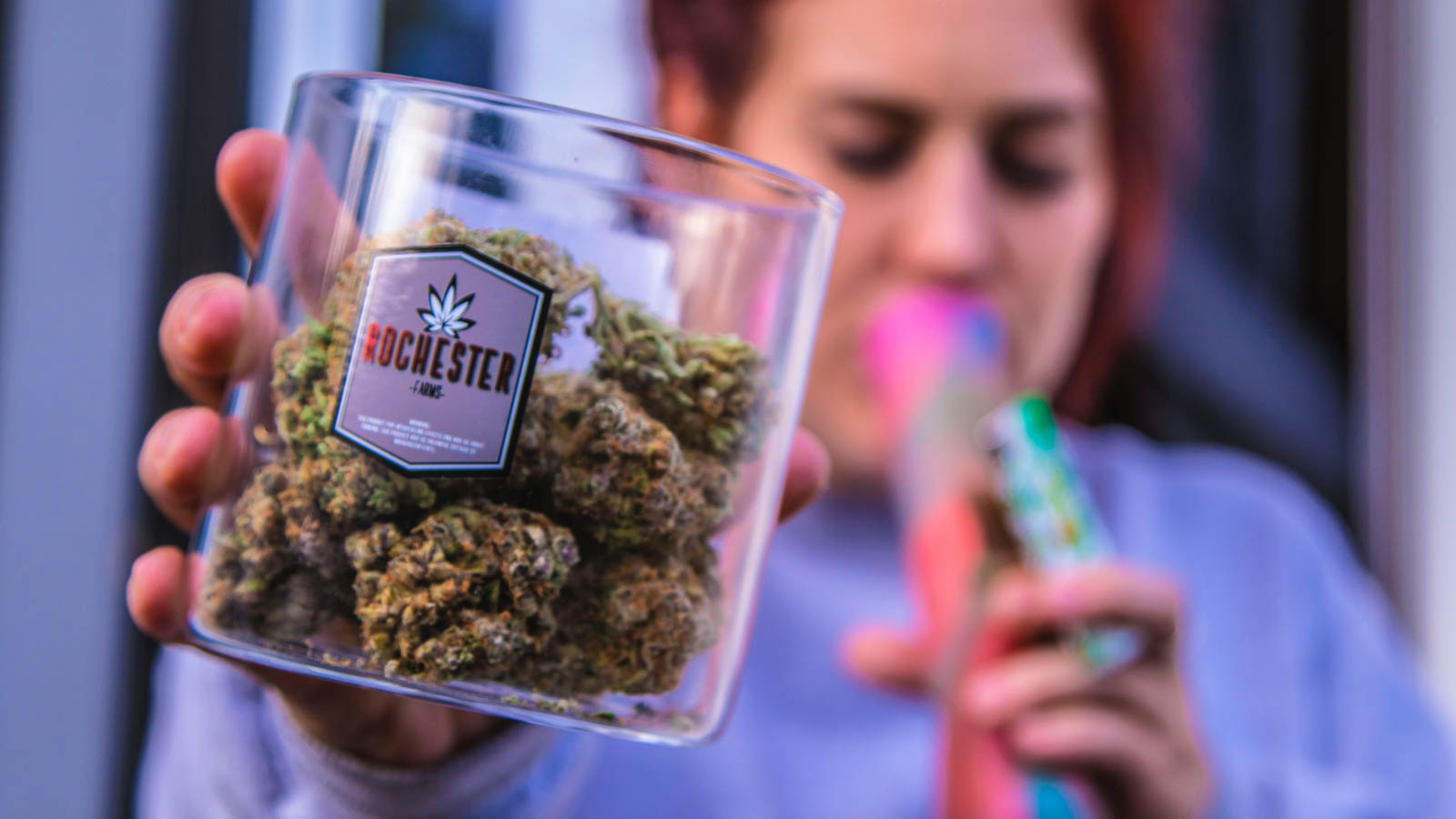
States That Outlaw Medical or Recreational Marijuana
Georgia
- Georgia's current medical marijuana laws only permit CBD in the form of extracts that are low in THC, 5% or less to be exact. A patient registry for those with qualifying conditions was established with HB 1, which was signed into law by Republican Gov. Nathan Deal on April 16, 2015. More recently, on May 9, 2018, Deal signed SB 16, a measure that expands the program by expanding the list of qualifying conditions and improving access to low-THC oil for hospice residents.
- Aside from CBD products, the state has not legalized medical or recreational weed.
Idaho
- The state has not legalized medical marijuana or adult-use cannabis.
Indiana
- After a couple of attempts to pass medical marijuana legislation in Indiana failed in 2015, legalization finally took place in April 2017 with the passage of HB 1148, a stringent measure which allows the use of CBD oil containing less than 0.3% THC for patients with uncontrollable seizures. In March 2018, Republica Gov. Eric Holcomb signed SB 52, allowing the use and sale of CBD products containing less than 0.3% THC by weight for any purpose.
- Aside from CBD products, the state has not legalized medical or recreational weed.
Iowa
- The Iowa Legislature passed SF 2360, or the “Medical Cannabidiol Act,” in 2014. The measure allowed patients with intractable epilepsy to use CBD products with 3% or less THC content. Three years later, the list of qualifying conditions was expanded under 2017 Medical Cannabidiol Act, which was signed into law by Republican Gov. Terry Branstad.
- Aside from CBD products, the state has not legalized medical or recreational weed.
Kansas
- Kansas allows no medical or recreational use of cannabis, but things are slowly starting to change in a state known for having one of the nation's strictest stances against cannabis legalization.
- Republican Gov. Jeff Colyer signed into law SB 263, also known as the Alternative Crop Research Act, on April 20, 2018, leading to the creation of a program that will investigate the potential benefits of industrial hemp. Currently, residents in Kansas can possess and use hemp-derived CBD products that contain no THC.
Kentucky
- Once the largest source of hemp plants in the continental U.S. before prohibition, Kentucky lawmakers decided to start hemp cultivation again with the passage of the 2014 Farm Bill. That same year, SB 124, a law that allowed patients to use CBD products with a physician's written approval, was signed into law by Democratic Gov. Steve Beshear. Multiple attempts to legalize and expand access to medical cannabis in Kentucky have been thwarted.
- Aside from CBD products, the state has not legalized medical or recreational weed.
Mississippi
- HB 1231, also known as Harper Grace's Law, was signed into law by Republican Gov. Phil Bryant in 2014, allowing patients suffering from an epleptic condition to possess and use CBD oil which contains no more than 0.5% THC.
- Aside from CBD products, the state has not legalized medical or recreational weed.
Nebraska
- Medical marijuana and adult-use cannabis are currently prohibited in Nebraska.
- There are several ongoing legislative efforts to legalize medical cannabis use in Nebraska. A petition initiative, sponsored by Sens. Anna Wishart and Adam Morfeld, aims to amend the state constitution to allow people to use, possess, and cultivate cannabis for serious medical conditions. Wishart also introduced a legislative bill, LB110, which offers the regulatory framework for a medical program.
- Aside from CBD products, the state has not legalized medical or recreational weed.
North Carolina
- House Bill 1220, or Epilepsy Alternative Treatment Act, was signed into law by Republican Gov. Pat McCrory in 2014. The measure gives patients with intractable epilepsy access to low-THC hemp-derived extracts. The law was expanded in July 2015 to increase the number of qualified physicians and number of certified hospitals.
- Aside from CBD products, the state has not legalized medical or recreational weed.
South Carolina
- In South Carolina, medical patients are legally confined to CBD oil that contains no more than 0.9% THC, which can only be recommended by licensed physicians under FDA-approved clinical trials. A medical cannabis bill, the South Carolina Compassionate Care Act, was being debated in the state Senate as of April 23, 2019.
- Aside from CBD products, the state has not legalized medical or recreational weed.
South Dakota
- The state has not legalized medical or adult-use marijuana.
Tennessee
- Similar to other states in the South, Tennessee has a highly constrained medical cannabis program that gives patients with intractable seizures access to hemp-derived CBD. A more expansive measure, which would expand the list of qualifying conditions and provide patients with sprays, pills, ointments, and other non-smokable forms of marijuana, has been delayed until 2020.
- Aside from CBD products, the state has not legalized medical or recreational weed.
Texas
- Legislators in the Lone Star State passed the Texas Compassionate Use Act, or SB 339, on June 1, 2015. The highly restrictive measure allowed the cultivation, production, and sale of low-THC cannabis oil to patients with intractable epilepsy and their caregivers. Smoking cannabis flower, either for medical or recreational purposes, is prohibited by law.
- Aside from CBD products, the state has not legalized medical or recreational weed.
Virginia
- The Old Dominion has a strict stance on both medical and recreational cannabis. CBD extracts which are low in THC can be recommended by a physician for patients with intractable epilepsy.
- Aside from CBD products, the state has not legalized medical or recreational weed.
Wisconsin
- The state has not legalized medical or adult-use weed.
Wyoming
- The medical cannabis system in Wyoming is currently restricted to CBD products that contain less than 0.3% THC by weight.
- Aside from CBD products, the state has not legalized medical or adult-use marijuana.
Featured Image: Antique U.S. map. (Photo by Sue Hammond/Flickr)

